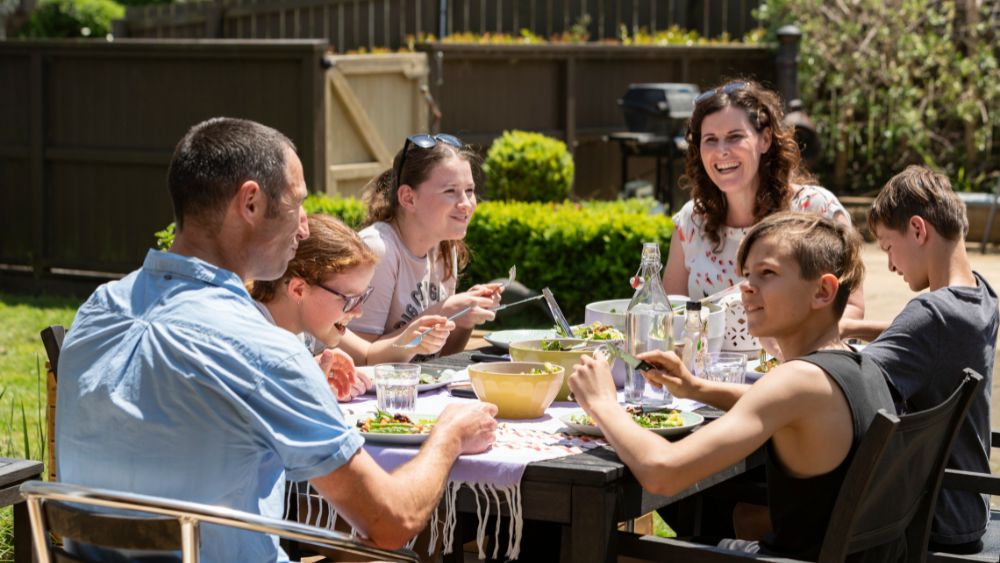It is also a time to consider what habits you’d like to bring into the new year and which ones you’d like to leave behind.
Small changes to your daily routines can make a big difference to your long-term health. Remember it’s not a single meal or workout that makes a difference – but a consistent approach.
Four steps to build a new healthy habit
We often think about 'breaking habits', but it’s more effective to focus on replacing old habits with new ones. The measure of success for a new healthy habit is when you realise it has become the default and no longer needs as much effort.
Think about what you enjoy and remember it is not a one-size fits all approach - everyone needs to find what works for them.
Here are our top tips for getting started:
-
Decide on a goal that you want to achieve for your health
Write your goal in your phone or diary. When you write it down your goal becomes a record of your commitment, but it also helps you to define it clearly. The more precise the better. Writing it down also lets your brain know that it’s important to you. Be SMART with your goals: Specific, Measurable, Achievable, Relevant and Time-related.
For example, instead of ‘I want to exercise more’, try to be precise with something more like, ‘I want to walk twice weekly on my lunch break and build up my fitness’.
-
Choose a simple action that will get you towards your goal
Here are some ideas of simple actions to inspire you:
- Fill your drink bottle at the start of each day.
- Plan a meat-free meal once a week.
- Serve half a plate of vegetables at dinner.
- Snack on vegetables between meals.
- Go for a 20-minute walk before or after lunch.
- Try a new recipe each week.
- Meal prep lunches for the week on Sundays.
- Turn off devices 1 hour before bed.
- Listen to a podcast once a week.
- Video call a friend or family member once a fortnight.
-
Choose a time and place that is already part of your daily routine
Consider adding small changes to your existing habits. 'Habit-stacking' can help you start something new. For example, when you usually collect the mail, add in a 10-minute walk.
-
Be consistent
It will get easier with time, and within 10 weeks you should find you are doing it automatically without even having to think about it.
Focus on building one new habit at a time. Once you’re comfortable with your new habit, you’ll have the confidence to tackle the next one.
Tips to help you create long-lasting healthy habits
Your goal doesn’t have to be medical
There are lots of different ways to prioritise your health and wellbeing. This could be as simple as planning to finish work at a reasonable time, connecting with people more regularly or investing time into learning a new skill.
Focus on the positive
Frame your goal positively without restricting the things you enjoy in life. For example, more movement on the weekends or eating more fruit during the day.
Find a cue in your day
A cue is something that consistently fits into an existing daily or weekly routine (for example, ‘When I go on my lunch break’ or ‘After I finish my morning coffee’). This provides a specific starting point to build a habit.
Start small
Start with one small change at a time. A small amount of physical activity or an extra half an hour of sleep is more beneficial than nothing at all. Even the smallest actions like 5 minutes of mindfulness or walking the kids to school can create change. If you try to make too many changes at once, you can easily get overwhelmed, and it may be easier to give up.
Break down big goals
If your goal is big, then break it down into smaller steps that can be achieved relatively quickly. This can lead to a sense of achievement and help to keep you focused, as well as prevent you from becoming overwhelmed by large goals.
Be kind to yourself
There will be ups and downs, times of sickness and holidays, busy periods and time when your motivation fluctuates. Don’t be too hard on yourself. The more you invest into building a habit – the easier it will be to get going again quickly. Here’s more advice on making lifestyle changes stick.
Stick at it
If you plan to wake up an hour earlier each day to go for a jog, the first month will be the most difficult. But if you can stick with it for a month, it will become much easier after that.
Celebrate progress
Share your journey with those around you and celebrate your milestones, big and small. Having support helps to keep you accountable to what you want to achieve. It also means you have people to share your progress with along the way. Celebrate every small change as you go.
Meet the expert: Dave Monro
Dave Monro is the Heart Foundation’s Chief Advisor, Food and Nutrition and is responsible for overseeing the Heart Foundation's food and nutrition work, including nutrition position statements, nutrition-related communications, and advising into a range of Heart Foundation programmes. Dave is a New Zealand Registered Dietitian and qualified chef and enjoys combining both of these elements to develop practical, achievable solutions for New Zealanders to eat healthier. He has a passion for building partnerships and sees this as a critical strategy for bringing about public health improvements. In his spare time, Dave enjoys running, touch rugby, rugby refereeing, and having an active role in his children’s sporting activities.
Disclaimer: The information in this article is general information only and is not intended as financial, medical, health, nutritional, tax or other advice. It does not take into account any individual’s personal situation or needs. You should consider obtaining professional advice from a financial adviser and/or tax specialist, or medical or health practitioner, in relation to your own circumstances and before acting on this information.









